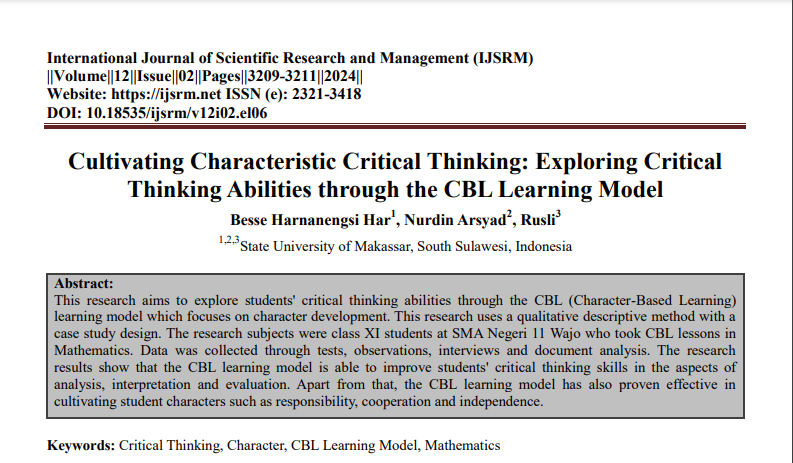Cultivating Characteristic Critical Thinking: Exploring Critical Thinking Abilities through the CBL Learning Model

Submission to VIJ 2024-02-22
Keywords
- Critical Thinking, Character, CBL Learning Model, Mathematics
Copyright (c) 2024 Besse Harnanengsi Har, Nurdin Arsyad, Rusli

This work is licensed under a Creative Commons Attribution 4.0 International License.
Abstract
This research aims to explore students' critical thinking abilities through the CBL (Character-Based Learning) learning model which focuses on character development. This research uses a qualitative descriptive method with a case study design. The research subjects were class XI students at SMA Negeri 11 Wajo who took CBL lessons in Mathematics. Data was collected through tests, observations, interviews and document analysis. The research results show that the CBL learning model is able to improve students' critical thinking skills in the aspects of analysis, interpretation and evaluation. Apart from that, the CBL learning model has also proven effective in cultivating student characters such as responsibility, cooperation and independence.
References
- Brookfield, S. D. (2017). Teaching for critical thinking: A practical guide. Routledge.
- Costa, A. L., & Kallick, B. (2009). Habits of mind: A developmental series of thinking tools for every learner. ASCD.
- Handayani, SL, Budiarti, IG, Kusmajid, & Khairil. 2021. Problem Based Instruction Assisted by E-Learning: Its Effect on Primary School Students' Critical Thinking Ability. Basicedu Journal. 5(2):697-705
- Johnson, L. & S. Adams. 2011. Challenge Based Learning: The Report from Implementation Project. Austin, Texas: The New Media Consortium
- Lickona, T. (1991). Educating for character: How our schools can teach respect and responsibility. Routledge.
- McTighe, J., & Wiggins, G. (2013). Understanding by design. ASCD.
- Purwati, R., Hobri, and Fatahillah, A. 2016. Analysis of Students' Critical Thinking Ability in Solving Quadratic Equation Problems in the Creative Problem Solving Learning Model. Kadikma: Journal of Mathematics and Mathematics Education. 7(1):84-93
- Rochmad & Masrukan. 2016. Study of Student Performance in Analyzing Material in Reciprocal Cooperative Learning. Kreano Journal, 7(1):47-5
- Yoosomboon, S. & P. Wannapiroon. 2015. Development of a Challenge Based Learning Model Via Cloud Technology and Social Media for Enhancing Information Management Skills. Procedia Social and Behavioral Sciences,174: 2102-210.